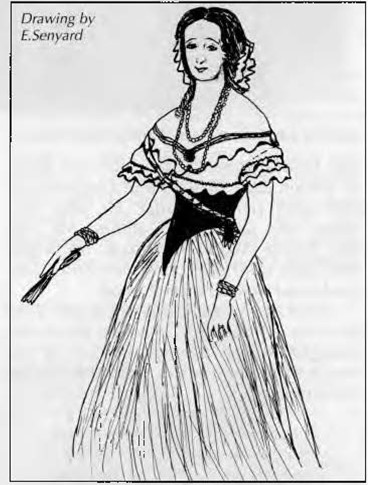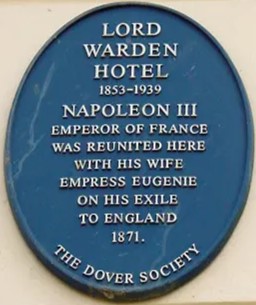This plaque was installed in December 2000
The LORD WARDEN HOTEL was opened in1853 on part of the site purchased ten years previously by the South-Eastern Railway Company. The company bought the land from the Dover Harbour Commissioners who, under a charter granted by James I, were the ground landlords of the whole of the area from the South Pier up to Archcliffe. The Railway Company paid £23,500 for the site, intended for the station and goods sheds, and decided to use part of it for a hotel. The railway was opened, using a temporary station, on 6th February, 1844, and the hotel nine years later.
One hundred years after its opening, the history of the hotel was described in an article in the Do ver Express in 1953, entitled “The building which knows 100 years of scandals”. So many famous, and infamous, people stayed at the Lord Warden it would be tedious to list them all. The Dover Express of the time, however, was quite happy to list, weekly, all the arrivals and departures of guests at the hotel. In the newspaper’s columns of Fashionable Intelligence and Local Intelligence one was able to check the comings and goings of all the fashionable set by consulting the paper. An advertisement in the appropriate column stated: “Visitors are respectfully informed that they may secure the correct announcement of their arrivals or departures by entering their names in a book kept for that purpose at Marsh’s Royal Adelaide Baths and at the Wellington Arcada.”
ver Express in 1953, entitled “The building which knows 100 years of scandals”. So many famous, and infamous, people stayed at the Lord Warden it would be tedious to list them all. The Dover Express of the time, however, was quite happy to list, weekly, all the arrivals and departures of guests at the hotel. In the newspaper’s columns of Fashionable Intelligence and Local Intelligence one was able to check the comings and goings of all the fashionable set by consulting the paper. An advertisement in the appropriate column stated: “Visitors are respectfully informed that they may secure the correct announcement of their arrivals or departures by entering their names in a book kept for that purpose at Marsh’s Royal Adelaide Baths and at the Wellington Arcada.”
Here, as an example, is one entry from the Dover Express of 7th August, 1858: Local Intelligence: Arrivals and departures at Birmingham’s Lord Warden Hotel – Lord Willoughby D’Eresby and Suite, the Count and Countess Linowska, Lord and Lady Digby and Suite, Lady Stewart and Suite, Col. and Mrs. Shakespeare, General Cowan and family, Col. Paget, Sir John and Lady Richardson The Lord Warden Hotel, Dover and family, Baron Rothschild and Suite, Sir Seaton Keith Stewart and Lady Stewart and Suite, General Buller, Mr. and Mrs. Shuter and family, Col. Blaine, Mr. and Mrs. Blythe, Misses Heathcote. Mr. Lister and Lady Charlotte Lister and Suite. Col. Dashwood and Mrs. Dashwood. The Lord Warden was obviously THE place to be seen in Dover. In the same year, 1858, the announcement of the first ball of the season appeared on 18th December.
Lord Warden Hotel, Dover;
J. Birmingham begs, respectfully
inform the Nobility, Gentry
and officers of the Garrison that
the First Subscription Ball
the Season at the hotel
will take place on Monday the 20th instant.
Under Distinguished Patronage.
The Express of the following week, (appearing on 25th December!) reported that the ball: “was attended by a numerous and most fashionable company, among whom were the elite of the town and its environs. The magnificent saloon of the hotel, which is susceptible of being converted into one of the most splendid ballrooms that can well be imagined, was elegantly and tastefully decorated with the gayest of floral festoons and other appropriate devices, and, brilliantly lighted and thronged as it was by the gay and beautiful, the scene presented could not have been surpassed, we are persuaded, in any ballroom in the county. Mount’s Quadrille Band was in attendance”.
Among the assembly were observed “several officers from Canterbury and Shorncliffe and, of course, a large contribution from our own garrison.” The refreshments were described as the most “recherche” and the writer says that the whole proceedings passed off “in a manner highly satisfactory to the assembled visitors and reflecting the utmost credit upon the spirited and liberal proprietor of the Lord Warden Hotel.” The reporter ends by listing the principal visitors and mentioning a future series of balls to be arranged.
Apparently, Charles Dickens was a regular guest at the Lord Warden and, in a letter dated 1863, he described his hosts at the hotel, Mr. and Mrs. Birmingham, as “my much esteemed friends”, at the same time adding that they were “too conceited with the comforts of the establishment.” He was probably right!
One of the most famous visitors was Napoleon III who, on his exile in 1871, was reunited with his wife, Eugenie, at the Lord Warden Hotel.
After the Birminghams the hotel was owned at one time by Gordon’s and later by Frederick’s and continued to be a fashionable place to stay throughout the nineteenth century.
An advertisement in 1893 stated: “This hotel is facing the Admiralty Pier and connected with the South Eastern Railway by a covered way. And with the London, Chatham and Dover Railway by Omnibuses and Flys, private or public, within two minutes drive. Luggage can be registered from Brussels and all parts of the Continent direct to Dover without re-registering at Calais.
BOATS. Private cabins especially reserved for visitors to the hotel can be booked in advance. H. Swainston. Prop.”
Until 1914 the Lord Warden was as popular as ever and still played host to many distinguished visitors. The book entitled Royal Visitors at Dover lists all the members of royalty who passed through Dover to attend the coronation of Edward VII in 1902 and later all those who landed here in 1910 to attend his funeral.
Between the wars the hotel still attracted a polished clientele and many recalled the nights of eating and dancing in the once-celebrated ballroom. In the Second World War it played a military role as a rest and signals centre. Post-war, in a shell-damaged and poor state, it was used as offices for British Rail as Southern House, then by Customs and Excise, before Stena took over. In 1998 the building was purchased by Dover Harbour Board from P&O/Stena Line, which inherited it from Stena. The Harbour Board now use it for offices.
REFERENCES:
Bavington Jones, John. Dover. A Perambulation of the Town, Port and Fortress. Dover Express, 1907.
Mowell, John H. Royal Visitors at Dover. 1937.
Bierman, John, Napoleon III and his Carnival Empire. Publ. John Murray 1989.
Hollingsbee, Bob. Article in the Dover Express in 1998. Dover Library. Back copies of the Dover Express from 1858. Dover Library.
The Empress Eugenie
At her wedding Eugenie wore a magnificent lace dress, a spray of jasmine and a diamond and sapphire belt. As Empress she became a leader of fashion. It was Eugenie who first popularised the crinoline and introduced the plunging neckline, which reached new lows during her reign. She wore gowns of Lyon silk to promote the silk industry. Top coiffeurs copied the style and colour of her hair. Court ladies copied her eyes and eyebrow styles. She assured the success of the young English couturier, Charles Worth, who was to become the dictator of dress for the haute monde of Paris.


